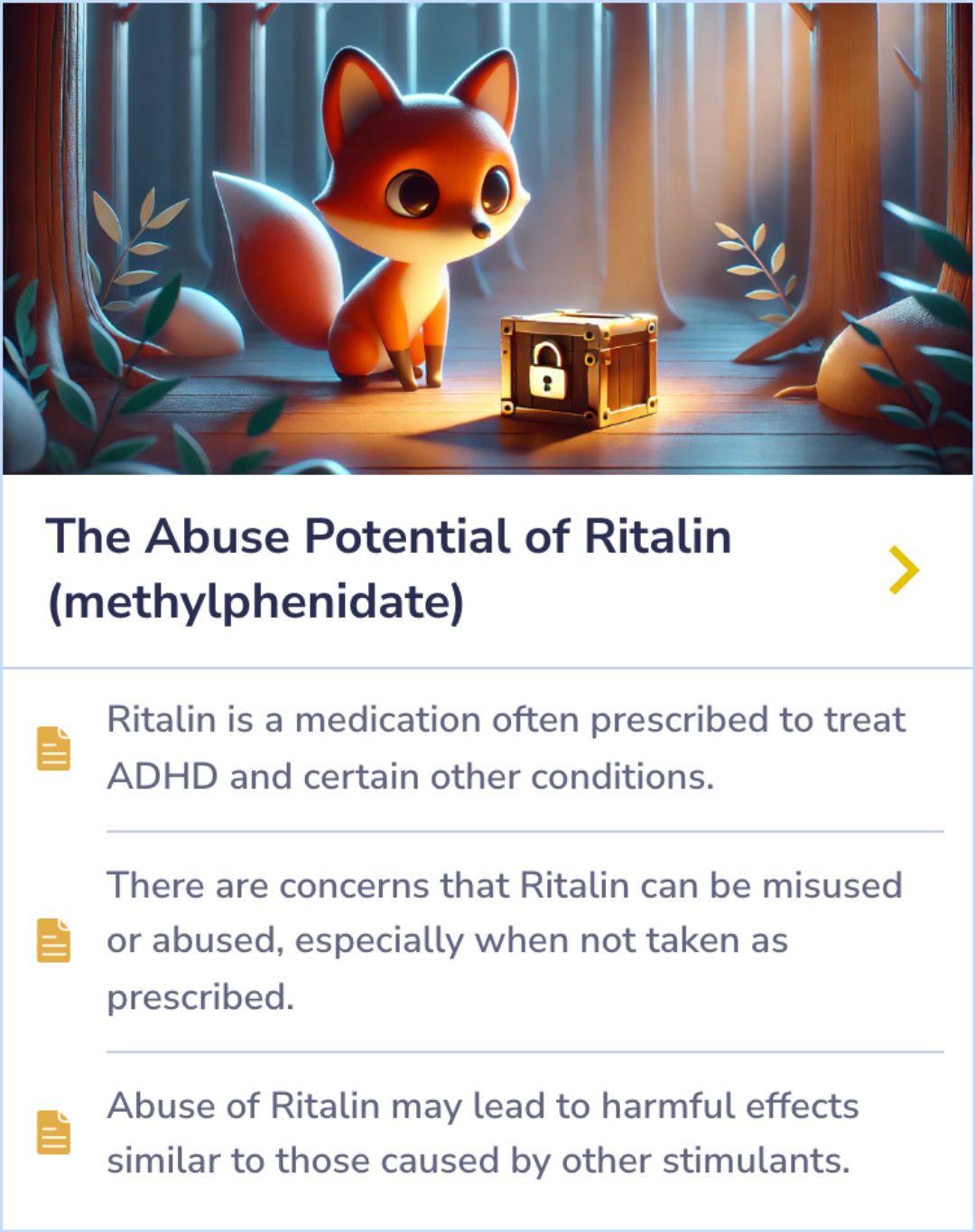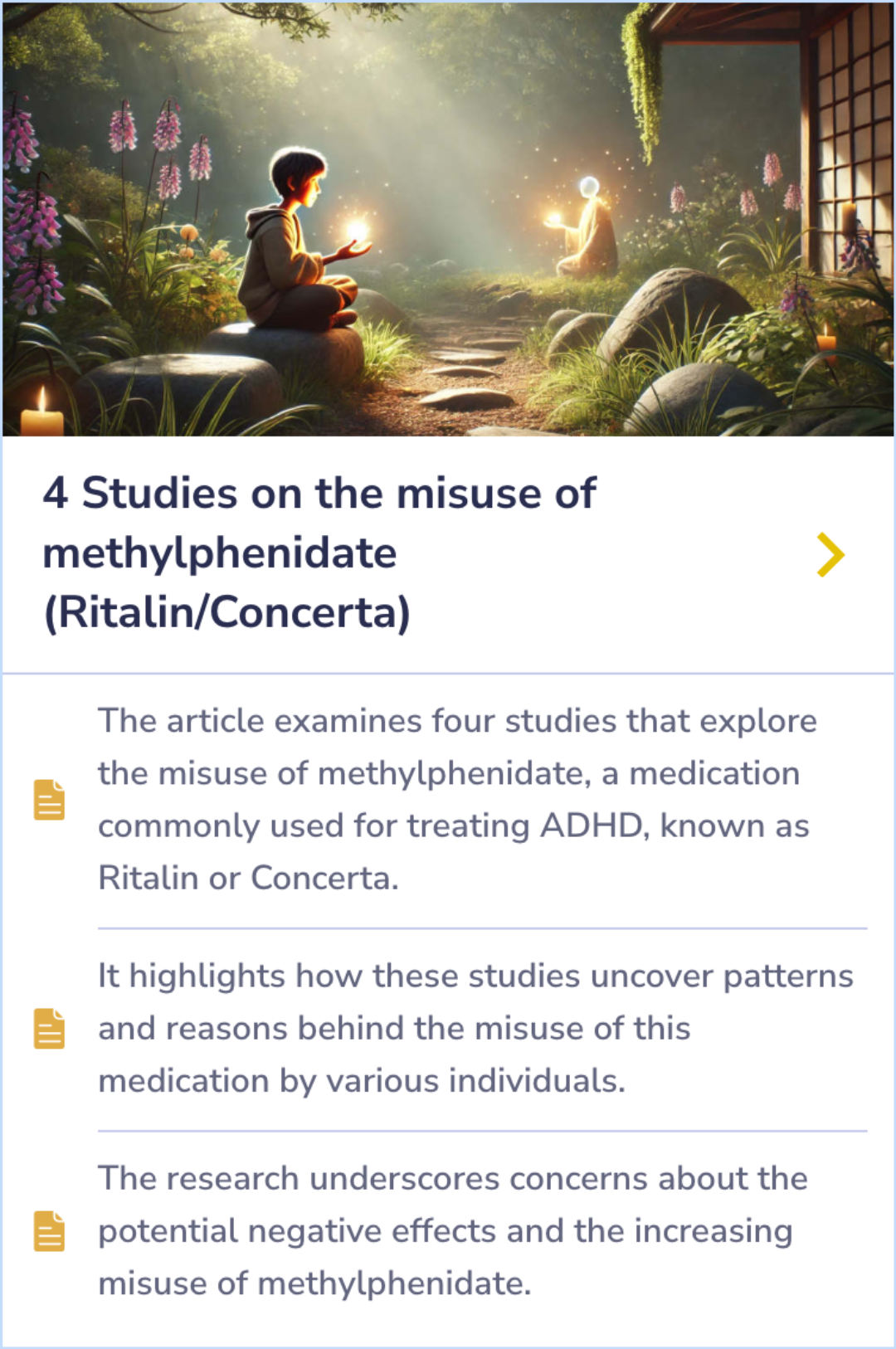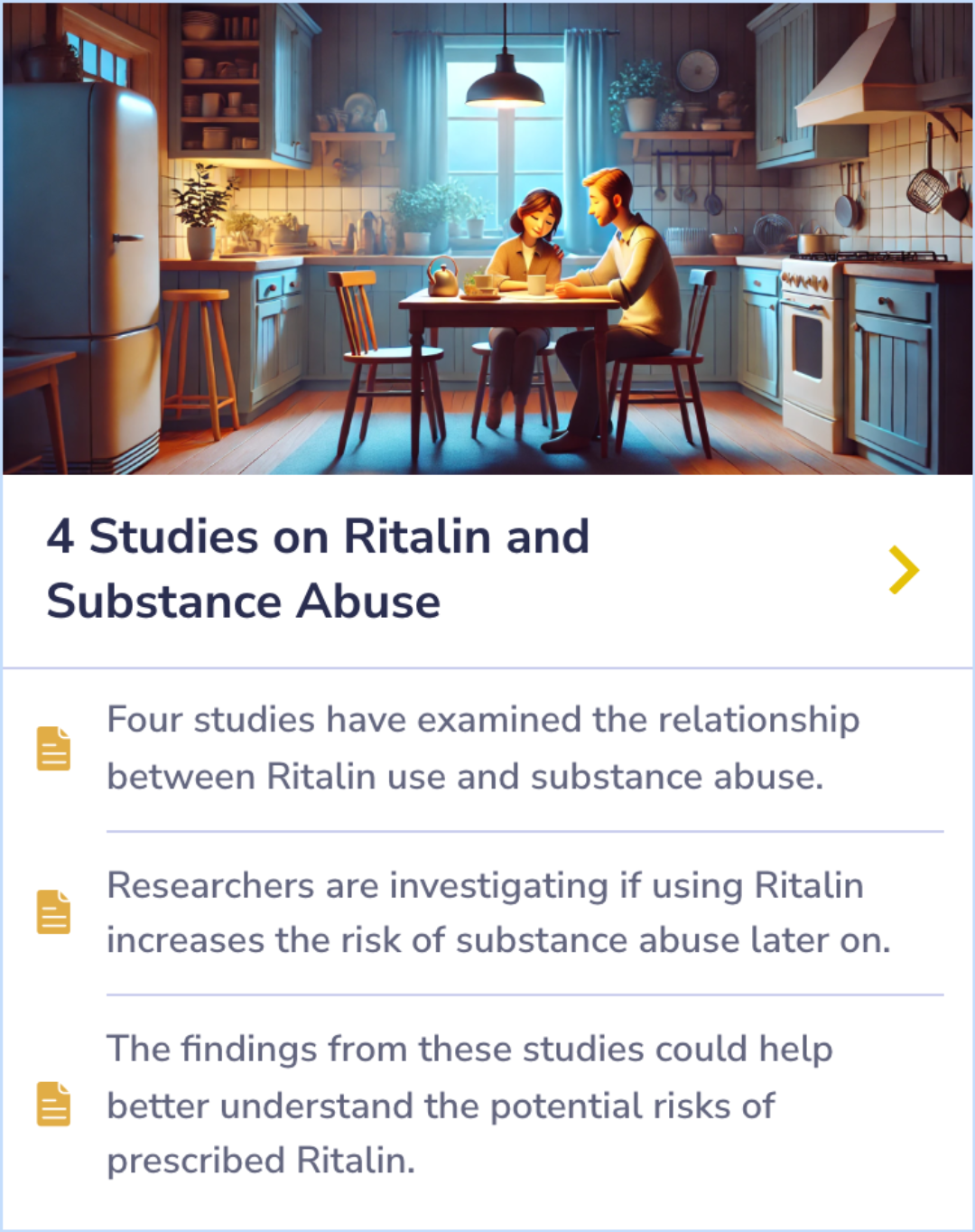Ritalin
Evidence Based Answers
What happens if you take Ritalin without ADHD?
Ritalin raises brain focus chemicals, popular among non-ADHD users seeking cognitive boosts, but risks include overstimulation, addiction, and health concerns.
Published: October 26, 2024
Click to explore a section:
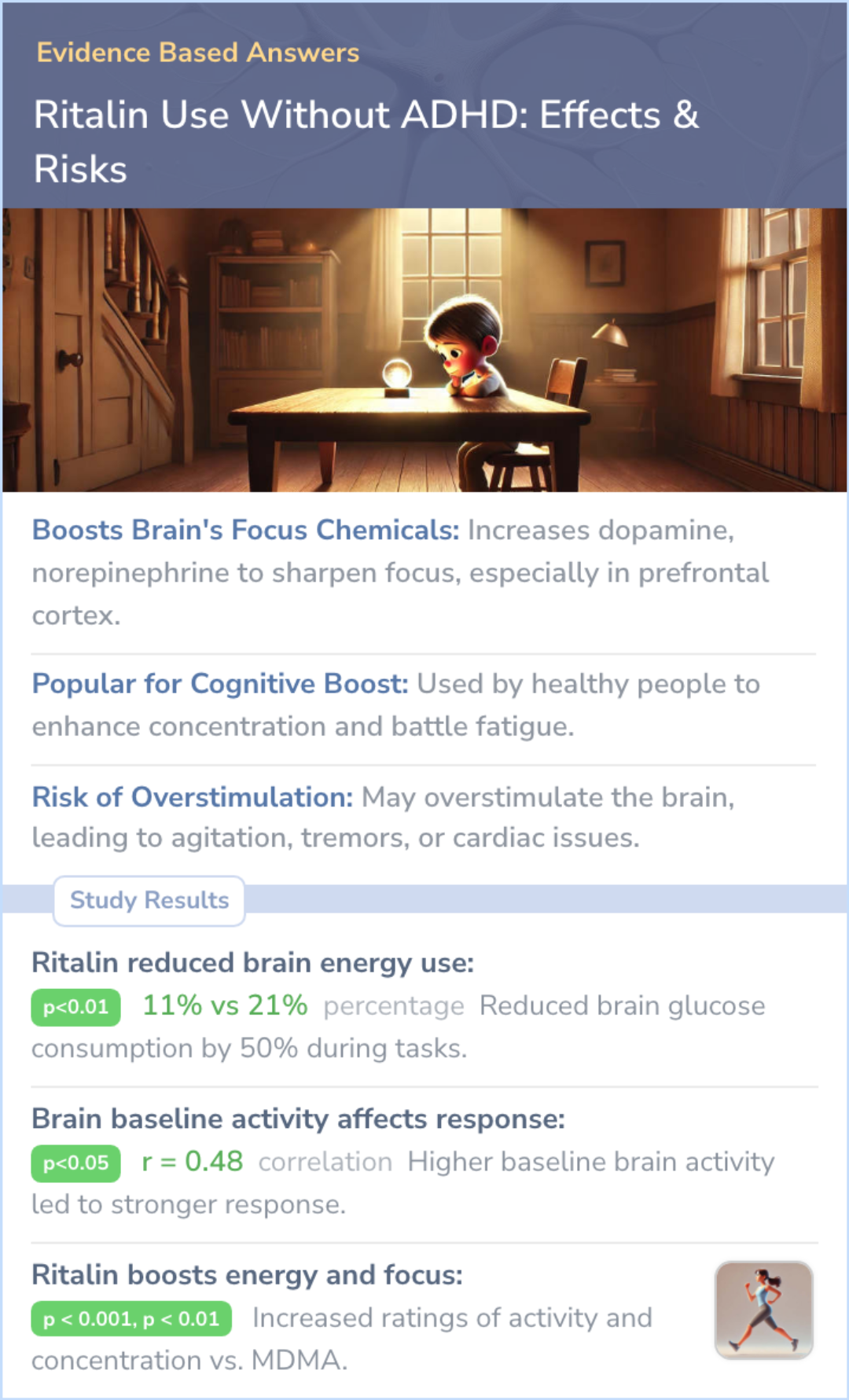
Ritalin enhances focus chemicals, appeals to healthy users, but may overstimulate.
Studies Summary
🧠
Ritalin boosts focus but increases risks
Enhances dopamine, norepinephrine for focus, with risks.
⚠️
Ritalin, MDMA mix heightens side effects
No added benefit with MDMA; increases cardiovascular risks.
😵
Misuse may lead to overstimulation and side effects
Can cause agitation, tremors, hallucinations in non-ADHD users.
Highly Cited Studies
Long term Effects of Methylphenidate in Adults
Peer Reviewed Study 1
Methylphenidate and MDMA: Risks Without Enhanced Effects
Peer Reviewed Study 2
Effects of Ritalin on cognitive performance in healthy individuals
Peer Reviewed Study 3
Ritalin does not enhance MDMA's effects but increases risks when used together
Background: How Ritalin Affects the Brain: Enhancing Focus
Ritalin increases dopamine and norepinephrine levels in the brain by blocking their reuptake. This enhances focus and alertness, especially in the prefrontal cortex, which is crucial for attention and impulse control. While this effect is therapeutic for ADHD, in non-ADHD users, Ritalin’s mechanism may lead to increased cognitive performance but without the medical necessity.
The artificial boost in neurotransmitter levels can make Ritalin popular for neuroenhancement, but the long-term consequences for non-ADHD users are unclear.
The artificial boost in neurotransmitter levels can make Ritalin popular for neuroenhancement, but the long-term consequences for non-ADHD users are unclear.
“
Source Quotes:
Methylphenidate blocks the reuptake of two neurotransmitters, norepinephrine (NE) and dopamine, in presynaptic neurons.
Methylphenidate blocks the reuptake of dopamine in the brain.
Background: Neuroenhancement: Why Some Use Ritalin Without ADHD
Ritalin’s cognitive-boosting effects make it popular among healthy individuals seeking neuroenhancement. These users often take Ritalin to improve concentration, focus, and to counteract fatigue. This trend is prevalent among students and professionals in high-pressure environments.
While these short-term benefits are reported, the ethical and health implications of using a prescription drug for non-medical purposes remain controversial. The increase in cognitive performance is appealing, but it does not come without risks.
While these short-term benefits are reported, the ethical and health implications of using a prescription drug for non-medical purposes remain controversial. The increase in cognitive performance is appealing, but it does not come without risks.
“
Source Quotes:
Psychostimulants are popular among healthy people seeking neuroenhancement.
In an online poll conducted by Nature magazine, 62% of users reported taking MPH for non-medical reasons.
Background: Ritalin’s Risks: Overstimulation and Side Effects
While Ritalin can increase focus, it may overstimulate the central nervous system, especially when taken by non-ADHD users. Symptoms like agitation, tremors, and nervousness are common side effects. In extreme cases, overstimulation can lead to hallucinations or even cardiac issues.
The risks of overstimulation are particularly concerning when the drug is used in higher doses, as often happens in cases of misuse. Monitoring for these effects is important, as they can have serious health consequences.
The risks of overstimulation are particularly concerning when the drug is used in higher doses, as often happens in cases of misuse. Monitoring for these effects is important, as they can have serious health consequences.
“
Source Quotes:
Signs and symptoms of acute overdosage...may include agitation, tremors, hyperreflexia, convulsions, hallucinations, delirium.
Insomnia and nervousness are the most commonly reported adverse effects in patients using methylphenidate.
Background: Addiction and Abuse Potential
Although Ritalin is used safely under medical supervision, its potential for abuse is significant. In non-ADHD users, high doses can activate the brain’s reward system, similar to other stimulants like cocaine. This can lead to addiction and psychological dependence.
While oral therapeutic doses typically do not trigger addiction, misuse through higher doses or different methods of administration can lead to dangerous consequences, making Ritalin a risky drug for those seeking neuroenhancement without medical need.
While oral therapeutic doses typically do not trigger addiction, misuse through higher doses or different methods of administration can lead to dangerous consequences, making Ritalin a risky drug for those seeking neuroenhancement without medical need.
“
Source Quotes:
Methylphenidate and cocaine both bind to the dopamine transporter and compete for the same binding sites in the striatum.
Higher dosages taken by those who intentionally abuse the drug lead to an overexpression of deltaFosB...which triggers the addiction.
Peer Reviewed Study
Study: Methylphenidate and MDMA: Risks Without Enhanced Effects
Methylphenidate (Ritalin) is a psychoactive drug that increases dopamine and norepinephrine in the brain by blocking their reuptake. This study examined how Ritalin interacts with MDMA ('ecstasy'), another drug that affects similar brain chemicals. The findings showed that taking Ritalin did not enhance the effects of MDMA, but using both together increased cardiovascular risks and adverse effects compared to taking either drug alone.
Methylphenidate was found to improve activity and concentration, while MDMA was more effective in boosting positive mood. Additionally, Ritalin affected how people recognized sad and fearful faces differently than MDMA, which decreased recognition of negative emotions. Overall, the combination of these drugs poses heightened risks without enhanced psychoactive benefits.
Methylphenidate was found to improve activity and concentration, while MDMA was more effective in boosting positive mood. Additionally, Ritalin affected how people recognized sad and fearful faces differently than MDMA, which decreased recognition of negative emotions. Overall, the combination of these drugs poses heightened risks without enhanced psychoactive benefits.
author
Volkow ND, Fowler JS, Wang GJ, Telang F, Logan J, Wong C, Ma J, Pradhan K, Benveniste H, Swanson JM
journal
PLoS One
Date Published
2008 Apr 16
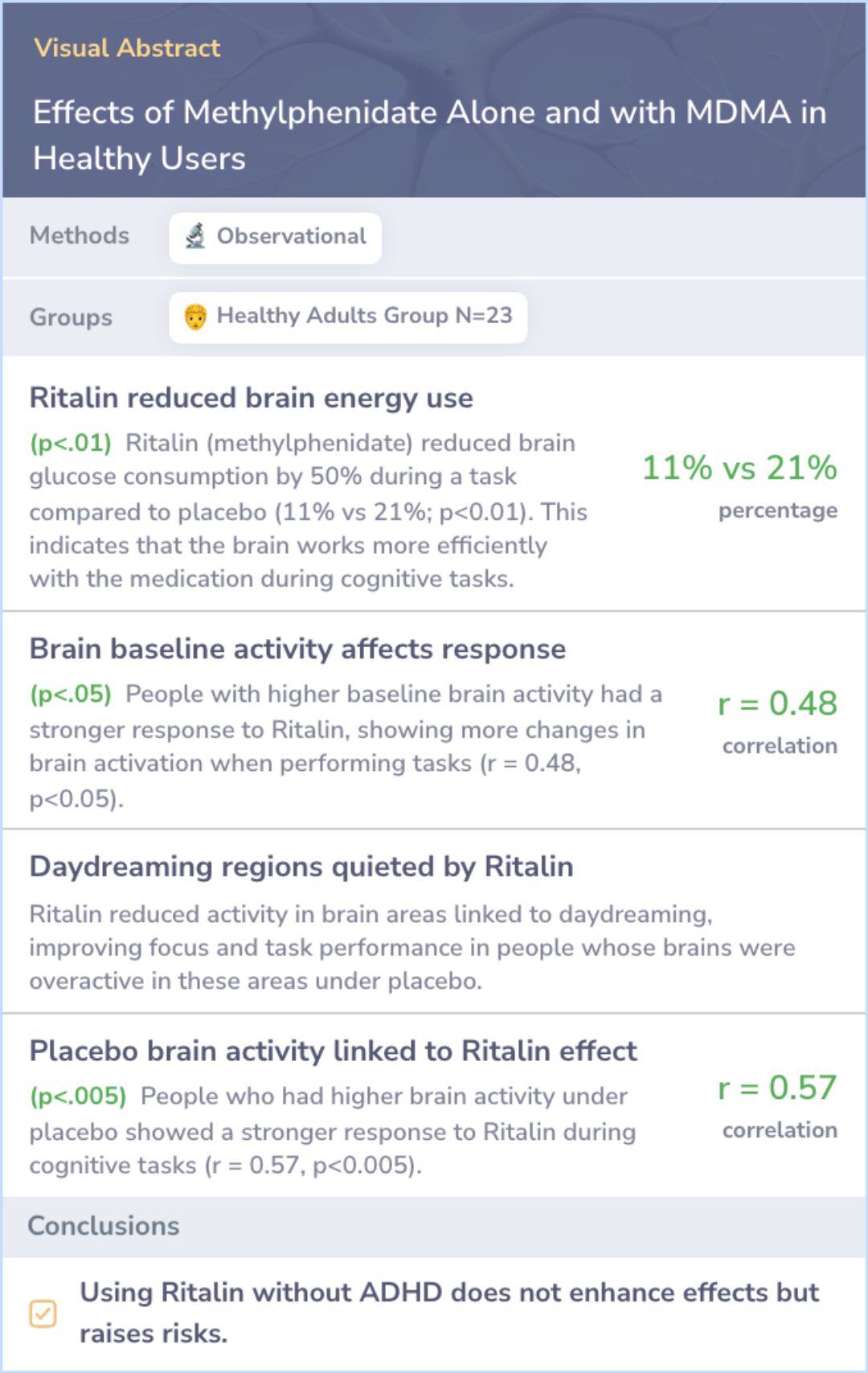
Peer Reviewed Study
Study: Effects of Ritalin on cognitive performance in healthy individuals
Methylphenidate (MPH), commonly prescribed for ADHD, is also used by the general population to enhance cognitive function. This review evaluates its effects in healthy individuals. Studies show that MPH improves working memory in 65% of cases and speed of processing in 48% of cases. Smaller improvements were noted in verbal learning (31%), attention (29%), and reasoning (18%). However, MPH does not enhance visual learning and memory.
MPH's effects vary by dose, with different responses across cognitive areas. MPH is linked to side effects and potential misuse, highlighting the need for more research on benefits versus risks.
MPH's effects vary by dose, with different responses across cognitive areas. MPH is linked to side effects and potential misuse, highlighting the need for more research on benefits versus risks.
author
Linssen AM, Sambeth A, Vuurman EF, Riedel WJ
journal
Int J Neuropsychopharmacol
Date Published
2014 Jun
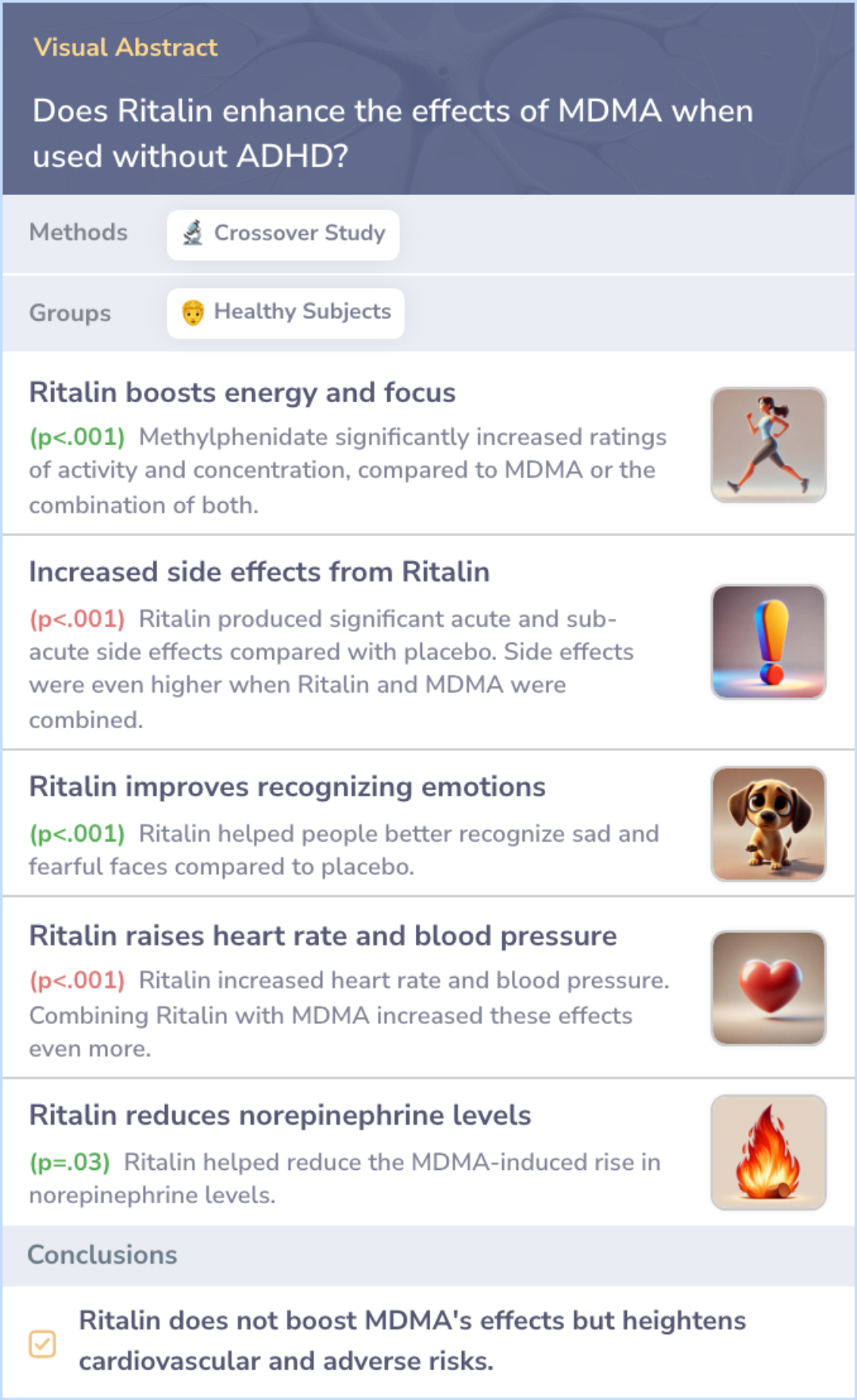
Peer Reviewed Study
Study: Ritalin does not enhance MDMA's effects but increases risks when used together
This study compared the effects of methylphenidate (Ritalin) and MDMA on healthy subjects. Methylphenidate did not enhance the psychoactive effects of MDMA, though it did have stimulant effects on its own.
When both drugs were combined, the cardiovascular and adverse effects increased, but no additional psychoactive effects were observed. Methylphenidate improved concentration and activity more than MDMA, while MDMA increased positive mood more than methylphenidate.
When both drugs were combined, the cardiovascular and adverse effects increased, but no additional psychoactive effects were observed. Methylphenidate improved concentration and activity more than MDMA, while MDMA increased positive mood more than methylphenidate.
author
Hysek CM, Simmler LD, Schillinger N, Meyer N, Schmid Y, Donzelli M, Grouzmann E, Liechti ME
journal
Int J Neuropsychopharmacol
Date Published
2014 Mar

Key Takeaways
Conclusions
Ritalin boosts dopamine and norepinephrine levels, enhancing focus and concentration, particularly in individuals with ADHD. However, in those without ADHD, it can artificially improve cognitive performance, raising ethical and health concerns. Studies reveal that while Ritalin may enhance certain cognitive functions, it also brings significant risks, including overstimulation and potential for addiction.
When used without medical necessity, especially in combination with other stimulants like MDMA, Ritalin increases cardiovascular risks and adverse effects without any added psychoactive benefits. These findings emphasize the complexity and danger of using Ritalin for neuroenhancement, particularly when misused.
When used without medical necessity, especially in combination with other stimulants like MDMA, Ritalin increases cardiovascular risks and adverse effects without any added psychoactive benefits. These findings emphasize the complexity and danger of using Ritalin for neuroenhancement, particularly when misused.

Evidence Summary
Misuse and Risks of Ritalin
Ritalin is a medication prescribed for ADHD, but its stimulating effects can lead to misuse when not taken as directed. When abused, it can cause harmful effects similar to those of other stimulants. This risk makes responsible use important.
Concerns arise when people misuse Ritalin to enhance focus or energy, as the drug's potential for abuse can lead to serious health issues, especially at higher doses or through improper use.
Concerns arise when people misuse Ritalin to enhance focus or energy, as the drug's potential for abuse can lead to serious health issues, especially at higher doses or through improper use.
Evidence Summary
Unpacking Methylphenidate Misuse Patterns
A review of four studies sheds light on the troubling patterns of methylphenidate misuse, which is commonly prescribed for ADHD. It uncovers the various reasons individuals might misuse this medication, revealing insights into user behavior and motivations.
These findings highlight the significant concerns regarding the rising misuse of methylphenidate. The research not only points to the effects of this misuse but also stresses the necessity for greater awareness and improved management strategies for this widely used ADHD treatment.
These findings highlight the significant concerns regarding the rising misuse of methylphenidate. The research not only points to the effects of this misuse but also stresses the necessity for greater awareness and improved management strategies for this widely used ADHD treatment.
Evidence Summary
Ritalin and Future Substance Abuse Risks
Research has focused on the connection between prescribed Ritalin and the risk of substance abuse later in life. Four key studies reveal insights into how Ritalin might influence future misuse patterns. These findings are critical as they shed light on the long-term effects of the medication on individuals who take it.
By examining the relationship between Ritalin use and subsequent substance abuse, researchers aim to uncover whether those who are prescribed this medication face increased risks. The studies serve as a foundation for understanding potential concerns surrounding Ritalin prescriptions.
By examining the relationship between Ritalin use and subsequent substance abuse, researchers aim to uncover whether those who are prescribed this medication face increased risks. The studies serve as a foundation for understanding potential concerns surrounding Ritalin prescriptions.
